The Santa Ana volcano hike is one of El Salvador’s most amazing experiences, with a super colored crater lake that can change blue or green depending on the day. It’s really stunning, especially if you’ve never seen an active volcano before.
Also known by the name Volcán Ilamatepec, this is the highest volcano in El Salvador, but the hike to the top is not too hard at all. You don’t need to be super fit, making it a great volcano hike for beginners.
Best of all, the Santa Ana volcano is located in a national park that’s accessible and easy to reach from either Santa Ana town or San Salvador, the capital city of El Salvador. All of these things combine to make it one of Central America’s best bucket list activities.
This travel blog will explain how to get to the Santa Ana volcano in El Salvador, how to do the hike with or without a guide, and everything else you need to know before you go!
Santa Ana Quick Facts*
- Distance: 7 kilometers (4.3 miles) return
- Elevation Gain: 465 meters (1,525 feet)
- Top Elevation: 2,381 meters (7,812 feet)
- Duration: 2 – 4 hours return
- Difficulty: Easy / Moderate

Santa Ana Volcano Hike
How To Get To Santa Ana Volcano In El Salvador
The Santa Ana volcano is located in western El Salvador, in the Cerro Verde National Park. You can get there by bus, car, or tour, depending on where you’re staying in El Salvador.
If you’re staying in Santa Ana town and plan to go by bus, you will need to take the bus #248 from La Vencedora bus station (map here), which leaves at 7:30 AM and takes about 2 hours to get to the volcano.
The bus cost is $1 USD per person and you have to arrive early to buy tickets. For the ride back to town, you can take the bus at 1:30 PM, or the last one is at 4:30 PM.
The other option is to book a driver or tour from Santa Ana town. I stayed at Hostal Las Puertas and the staff there was able to arrange a driver to take me to the volcano the following day. I shared the van with one other traveler, and my cost was a very reasonable $21 USD.
This didn’t include the guide or entrance fees for the hike, but it covered all of the transportation for the day, including a visit to Lake Coatepeque after our hike.
How To Get There From San Salvador
If you’re staying in the city of San Salvador, there’s no bus option directly to the volcano. You’ll need to take a bus to Santa Ana town, stay overnight, and then do the hike the next day, or else book a day tour to the volcano that includes transport from San Salvador.
If you’re staying at El Tunco beach, once again, there’s no bus directly to the Santa Ana volcano, but Viator has day tours to Santa Ana volcano with transport to and from El Tunco or anywhere in the La Libertad area.
Doing it like this is a bit more pricey, but it’s the easiest and most convenient way to do it if you’re staying outside of Santa Ana town and you just want to go straight to the volcano from San Salvador or El Tunco.
Otherwise, if you have a little extra time, you can take the bus from either of these areas to Santa Ana town, and then climb the volcano the next day.

The spectacular crater lake of Santa Ana
Best Santa Ana El Salvador Tours
If you just arrived in El Salvador and want to get to the volcano as quickly as possible, GetYourGuide has a full day Santa Ana volcano tour with pickup from any hotel or residence in San Salvador.
This tour includes a bilingual English and Spanish hiking guide, and all of the entrance fees for the national park. If you want to skip the time and hassle involved in getting the bus to Santa Ana, then this tour is probably your best bet.
We’ve used GetYourGuide for lots of tours and activities around the world, and they’re great. Highly recommended!
Book Now: Santa Ana Volcano Tour From San Salvador
Santa Ana Volcano Hike: What To Expect
When you arrive at the Santa Ana volcano, everyone will be herded into a group and assigned a local guide. The guide is an official requirement for this hike, even though it’s arguably not needed (more on that later).
There’s one guide assigned to every 10 people or so, and he’ll accompany your group and lead you to the top of the volcano and back. The guides are slow and easy to follow. They’ll give you plenty of breaks to rest along the way.
The hike starts with a quick briefing in Spanish where they explain the fees and remind everyone not to litter, bring noisy speakers, or carry weapons. If you don’t understand Spanish, you won’t miss too much from the briefing.

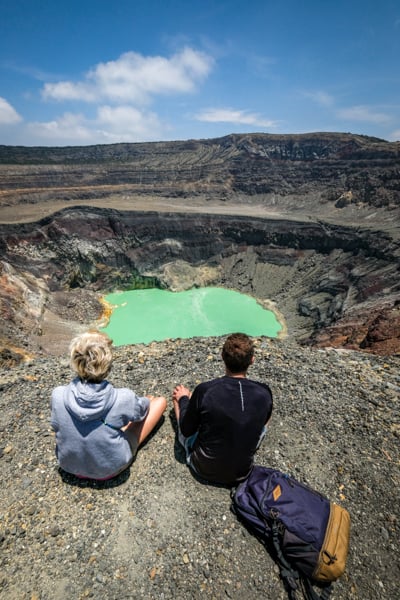
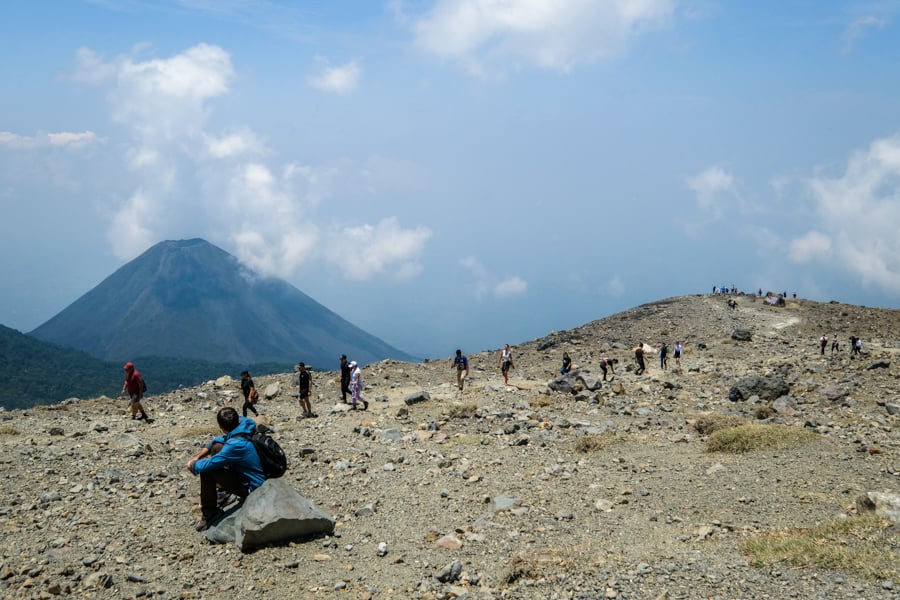
Rocky but tame incline near the top of Ilamatepec
There are basically two parts to the Santa Ana volcano hike. For the first part, you’ll be hiking through a shaded forest to the national park boundary, where where’s an official booth and you’ll pay for your tickets to enter the park.
For the second part of the hike, the path is more uphill and the forest will gradually turn into a rocky volcanic landscape with no trees or plants. This part is a bit harder and you’re in the sun all the time.
Along the way, there are several nice viewpoints to enjoy, including a lookout tower you can climb, although I think it’s better to save your energy and perhaps do the tower on the way back down.
All along the hike, there are almost constant views of another volcano not too far away. That’s the Volcan de Izalco, which is another of El Salvador’s iconic volcanoes!
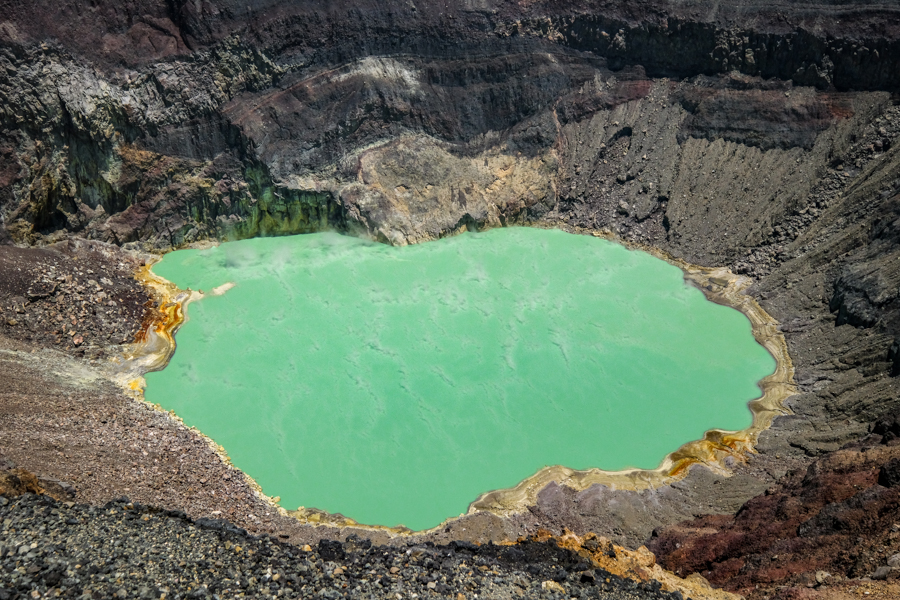
Smoking green lake of the Santa Ana crater. Bizarre and beautiful!
Santa Ana is a very popular hike, so you’ll always be around people. The top is especially crowded, but if you keep walking along the crater rim then you can still find a good spot to take pictures without people blocking the view.
The bubbling green sulfur lake is really stunning and it reminded me of Mount Ijen in Indonesia. We had perfect clear weather, and I wished I had brought my drone!
Be careful at the edge of the crater, because it feels deceptively less steep than it actually is, and a fall into the crater would be a bad way to go. The police will blow their whistles at you if they see you getting too close to the cliff.
Meanwhile, there are some friendly local guys selling popsicles at the top, which can be a fun reward after the hike. Bring small cash in US Dollar bills if you plan to buy some!
The trekking guides only allow you to stay at the top for about 30 to 45 minutes before heading down, so it felt a bit rushed. That’s one of my only complaints. I would’ve liked to spend at least an hour or two up there!
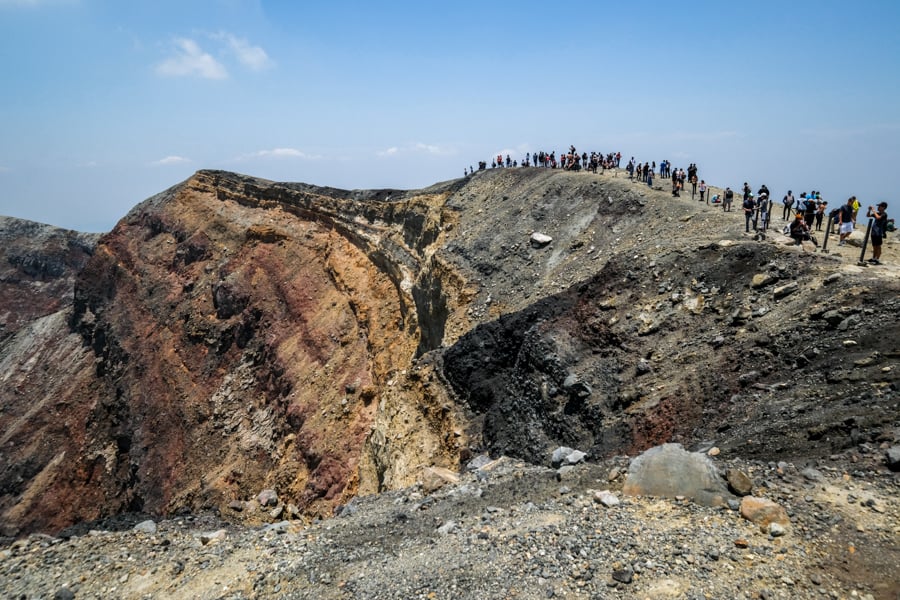
Remember to be careful and watch your step near the crater rim
• How Hard Is The Santa Ana Volcano Hike?
The Santa Ana volcano hike is not very hard, even if you aren’t a regular hiker or in great shape.
I’d say if you can hike uphill on dirt and rocks for about 1.5 hours, with plenty of breaks mixed in there, then this hike won’t be any problem for you at all. Most people can reach the top of the volcano in 1 to 2 hours, depending on their pace. Fast hikers can reach the top in 1 hour or less.
The top of Santa Ana is not high enough to cause altitude sickness, so you don’t need to worry about that. The one way distance to the crater is about 3.5 kilometers (2.2 miles), with an elevation gain of 465 meters (1,525 feet).
Overall, it’s extremely easy compared to something like the Acatenango hike in Guatemala. This volcano is not even in the same category as that one.
Going back down from the Santa Ana volcano is even quicker and easier because it’s all downhill, although you’ll want to watch your step so you don’t slip on loose rocks.
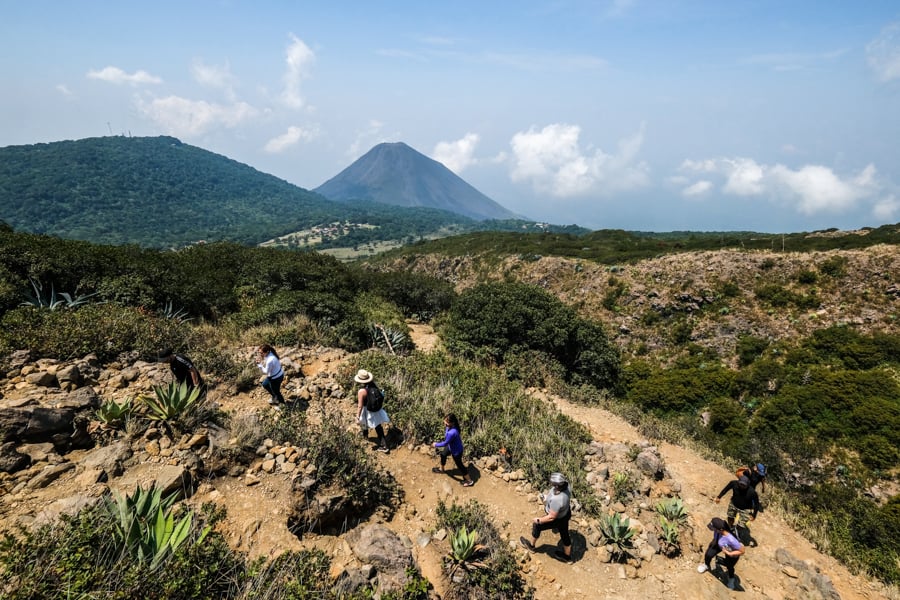
The Santa Ana volcano hike is not very hard and most people won’t have any problem with it.
• Can You Hike Without A Guide?
Officially, a guide is required for the Santa Ana hike, and they won’t let you go up without one.
Sometimes you might be able to avoid this requirement by showing up early at the trailhead and starting the hike without the guides seeing you, but people have reported limited success with this.
The trail is pretty easy to follow, so a guide is honestly not needed. Most of them barely speak English anyway, and you’ll be following a steady stream of hikers the whole time, so it’s almost impossible to get lost.
I understand why it annoys some people to be forced to hire a guide, but the prices are really not too bad ($3/person) and you can think of it as a nice way to give back to the country and the people of El Salvador.
• Guide & Entrance Fees
- Parking Fee (Self Drive): $2 USD
- Entrance Fee (Foreigners): $6 / person
- Entrance Fee (Locals): $3 / person
- Guide Fee (Shared): $3 / person
- Guide Fee (Private): ~$35 (negotiable)
All of the fees at Santa Ana volcano are cash only (US Dollars). They don’t have any way to accept credit cards or online payment.
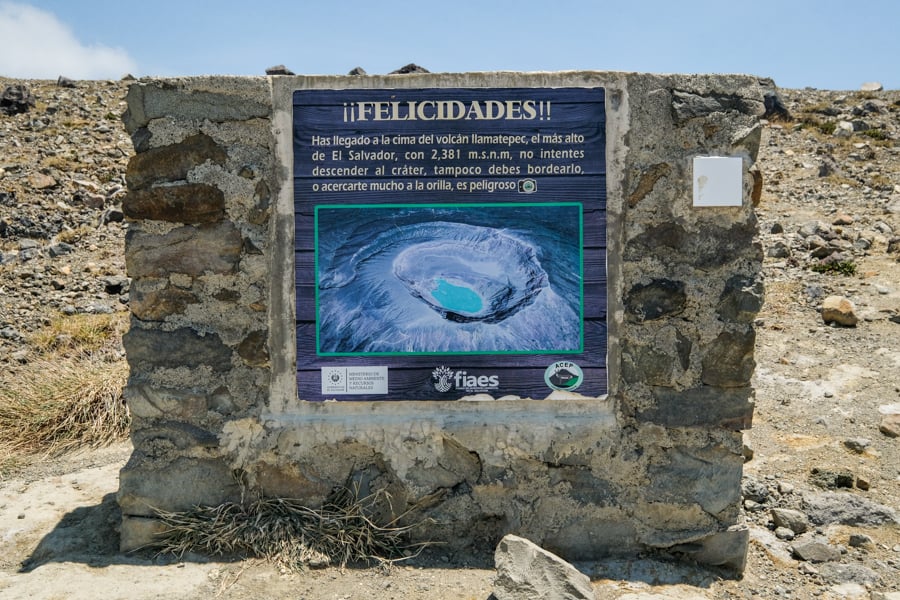
When you see this sign, you’re near the top of the volcano. Congratulations!
• What To Bring
- Layers: A light jacket is good to bring because it can be cool and windy at the top of the volcano, especially if it’s cloudy. If the sun comes out, you can shed the jacket.
- Footwear: Any shoes will work for the Santa Ana volcano hike. You don’t need top of the line hiking boots. I’d avoid wearing flip flops, because you’ll be walking on slippery gravel some of the time.
- Sun Protection: With the high elevation at Ilamatepec, you can get quite a burn here on a sunny day, so you’ll want to wear a hat and sunscreen.
- Water: Bring plenty of water to drink. On hot days you’ll need more. There’s no stream water to pick up on the hike, but there are drink stands run by locals near the entrance where you can buy bottled water, Gatorade, and snacks if you need them.
Is Santa Ana Volcano Safe?
Even though the country of El Salvador has some safety issues, the Santa Ana volcano is generally pretty safe in terms of crime.
They check everyone’s bags for weapons at the start of the hike, and there are armed guards (police) at the top and bottom of the volcano to keep away robbers. This may not give you the greatest vibe, but it’s still necessary at the moment because of El Salvador’s crime situation, and they want to keep hikers safe here.
With that said, many people hike the volcano every day and I haven’t heard of any recent robberies or other safety incidents here. I will update this travel guide if that changes. I visited as a solo traveler and used my Fuji camera to take pictures at the top of the volcano, but I kept it inside my bag otherwise.
If you want some extra peace of mind, you could also bring a hidden travel belt (like this one on Amazon) and put some of your valuables in it. That’s what I did with my phone, cash, and credit cards since I wasn’t using them during the hike.
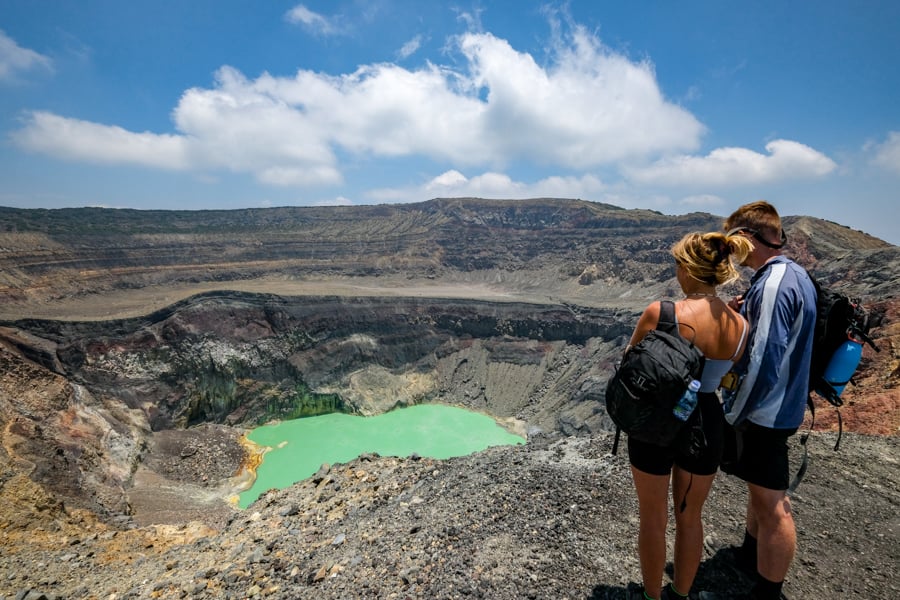
The Santa Ana volcano hike is pretty safe in most ways
Of course, the other question about safety is the volcano itself, since it is an active volcano.
Santa Ana erupted in October 2005, for example, shooting out giant rocks the size of cars, and forcing thousands of locals to flee the area. Before that, the last eruption was in 1904, so it’s somewhat rare for that to happen.
The volcano is monitored by the El Salvadoran government for any unusual activity, and the crater will be closed to hikers if it’s not safe. You can check recent updates on the volcanic activity here.
We still can’t perfectly predict when the next eruption will happen at Santa Ana, but that’s just one of the risks you have to accept when you climb an active volcano. Overall, I think this one is fairly safe as long as you follow the status updates.
Other Tips For Santa Ana Hike
- Bathrooms: The last bathrooms are near the national park boundary, shortly after you pay and get your little paper tickets. You’ll want to take care of any toilet business here, because there’s no bathroom and almost no privacy later in the hike.
- Snacks & Drinks: You can buy snacks and drinks at the national park boundary as well. There are plenty of choices, but everything costs a bit more than what you’d pay in Santa Ana town.
- Cell Service: I had a little bit of phone reception at the top of the volcano, so you may be able to send and receive texts here if needed. It’s not too remote.
- Wildlife: If you’re lucky, some of the animals you may see in Cerro Verde include coatimundis, deer, eagles, foxes, or tigrillos (little tiger cats).
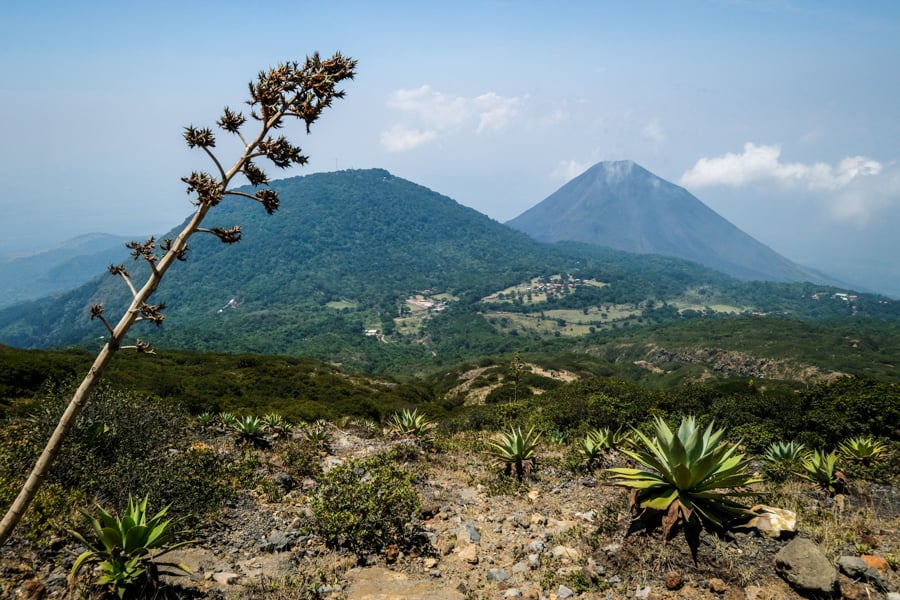
Views of Cerro Verde National Park and the Izalco volcano in the distance
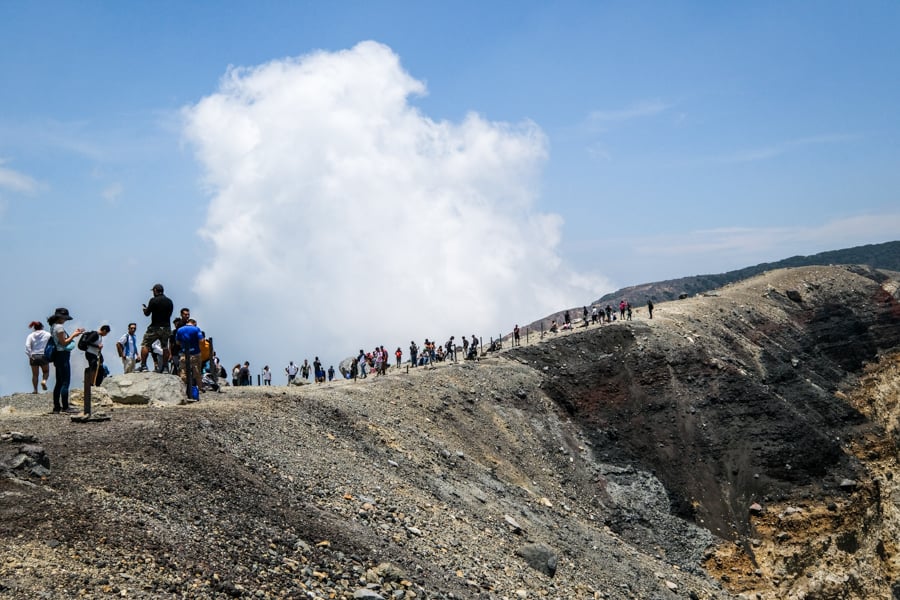
A busy day at the crater
Best Time To Hike Santa Ana Volcano
The best time to hike Santa Ana volcano is during the dry season in El Salvador, which runs from November to April. During this time, you have the best chance of sunny weather, that way you can see the lake and summit uncovered by clouds and rain.
The wet season in El Salvador runs from May to October, but it’s especially likely to rain in June, July, August, and September. You can still hike Santa Ana during these months, but it’s not ideal since you may not be able to see anything if it’s too cloudy. And if there’s a storm or heavy rain, then all hiking may be canceled for the day.
However, since you’re dealing with a mountain, the weather isn’t completely predictable at any time of year, and you could have bad weather in the dry season or good weather in the rainy season.
Is The Santa Ana Hike Worth It?
Yes, the Santa Ana hike is so worth it. If you’ve never climbed an active volcano before, this is a great place to start because it’s relatively easy and the view of the sulfur lake is amazing.
Santa Ana is easily the best day hike in El Salvador, and as a bonus, you can also say you climbed the highest volcano in El Salvador too! It’s more than worth the effort!
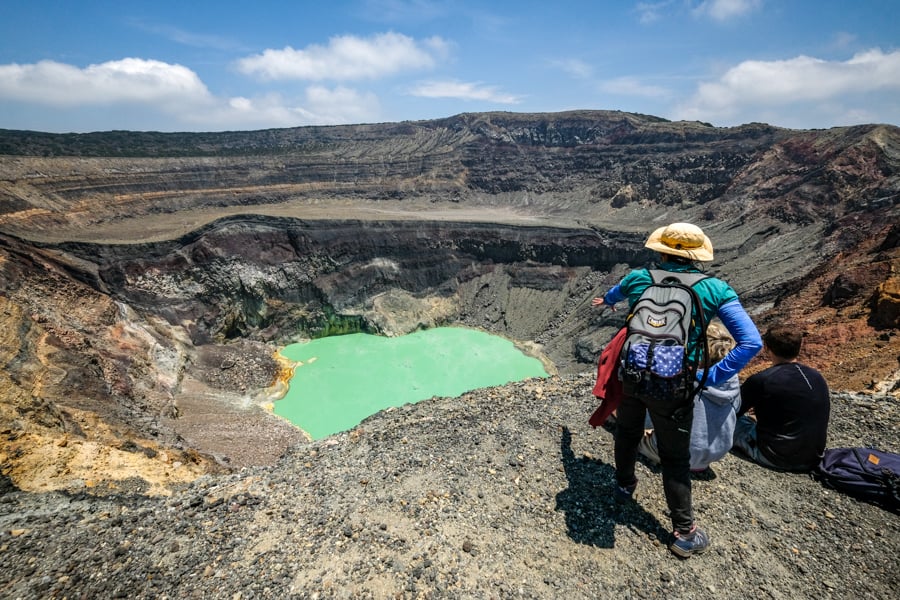
The Santa Ana volcano hike is such a great experience. Don’t miss it!
More Central America Travel Tips
Thanks for looking! I hope you enjoyed this guide for the Santa Ana volcano hike (also known as Ilamatepec) in El Salvador.
Don’t forget to check out my other travel blog posts for Central America and South America before you go!
Happy travels!